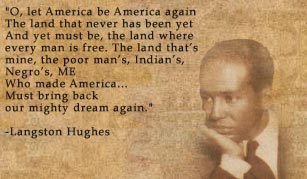
 James Mercer Langston Hughes
James Mercer Langston Hughes was an American
poet, social activist,
novelist,
playwright, and
columnist. He was one of the earliest innovators of the then-new literary art form called
jazz poetry. Hughes is best known as a leader of the
Harlem Renaissance. He famously wrote about the period that "the negro was in vogue", which was later paraphrased as "when Harlem was in vogue".
Both of Hughes' paternal great-grandmothers were African-American and both of his paternal great-grandfathers were white slave owners of Kentucky. Hughes's maternal grandmother Mary Patterson was of African-American, French, English and Native American descent. Mary is one of the 1st women to attend
Oberlin College. In 1869 the widow Mary Patterson Leary married into the elite, politically active Langston family. Her second husband was
Charles Henry Langston, of African-American, Native American, and Euro-American ancestry.
He and his younger brother
John Mercer Langston worked for the
abolitionist cause and helped lead the Ohio Anti-Slavery Society in 1858. Charles Langston later moved to Kansas, where he was active as an educator and activist for voting and rights for African Americans. Charles and Mary's daughter Caroline was the mother of Langston Hughes.
Langston Hughes was raised by his maternal grandmother, Mary Patterson Langston, who instilled in her grandson a lasting sense of racial pride.
While in
grammar school in Lincoln, Hughes was elected class poet. During high school in Cleveland, he wrote for the school newspaper, edited the yearbook, and began to write his first short stories, poetry, and dramatic plays. Hughes worked as a busboy at the Wardman Park Hotel. There he encountered the poet
Vachel Lindsay, with whom he shared some poems. Impressed with the poems, Lindsay publicized his discovery of a new black poet. By this time, Hughes's earlier work had been published in magazines and was about to be collected into his first book of poetry. The following year, Hughes enrolled in
Lincoln University, a
historically black university and joined the
Omega Psi Phi fraternity. Hughes identified as unashamedly black at a time when blackness was démodé. He stressed the theme of "black is beautiful" as he explored the black human condition in a variety of depths
/ His main concern was the uplift of his people, whose strengths, resiliency, courage, and humor he wanted to record as part of the general American experience.
















No comments:
Post a Comment